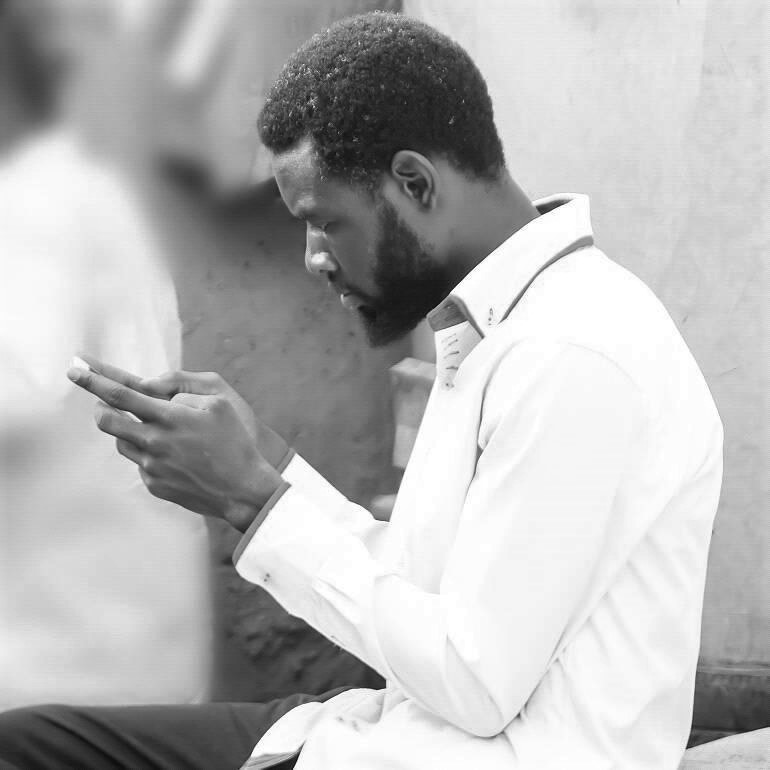Konya Shamsrumi: What is the process of writing a poem like for you? Is it a lot of hard work or easy?
David Onotu:
Like the shoot of a hibiscus at dawn
Or the restive kick of an unborn child…
The process of writing a poem comes easy for me, inasmuch as I am tuned in to the frequency of the emotion wherein the poem is wrapped. At that point, the right words, like soldiers on parade, fall into position. It becomes a sweet communion, a conversation with an old friend, a prayer, a favourite song on repeat or even a war of evenly matched opponents, exciting, exhilarating, an easy-like thing.
Sometimes I am the messiah
Other times I am a foul thing nailed to a cross.
That is why I pray
when no one is watching,
and if I cry my tears must not be seen
I am the laughing prince,
I am the minstrel man,
with eyes always dancing,
and heart often merry.
It is this that makes me fear,
this other side that none can see…
Konya Shamsrumi: Please describe your sense of identity in this or any possible world in imagery or metaphor?
David Onotu: An observer. That is the shortest description of myself taught to me by my mind, based on how it interprets the images collected from experiences in this and all other worlds so far encountered. Beyond this description of myself is a lengthier one. To ensure that those around me, family, friends, neighbors, and to an extreme, fellow ‘worldfarers’ are cared for and to a socially acceptable and legal extent comfortable, living a life of fulfilment and dignity is a consciousness that pervades my sense of being. Knowing that the world is full of surprises and nature springs unexpected wonders or miseries at us, and in many cases we are powerless to its whim, has in no small measure necessitated this consciousness or ideology that has carved the identity of ‘Observer’ for me.
Konya Shamsrumi: If any of your poems could literarily save a person’s life, which poem would it be and can you describe the person whose life you think it would have saved?
David Onotu: If any of my poems can literarily save a person’s life, it would be ‘Leila’. Leila was a little girl, her age ranged between 13 and 15, her family, with whom she lived, resided on the same street I did with my parents. She suffered from mental health challenges and was always shabbily dressed. This condition of hers did not earn her many friends. Family and neighbors saw her as weird and never really showed any real care. I can remember how she had followed me into a provision store and would request I purchase something for her, usually a snack. I don’t know for certain, but I guess she did this with many other people. The generally nonchalant and uncaring treatment she got from family and neighbours worsened her condition, I believe. She died eventually.
If it was published prior to her demise, I think my poem could have saved her. It may have encouraged her family and neighbours to reconsider their attitude towards her and be more caring, thus improving the quality of her life and possibly averting her premature death.
Leila
It was on a misty evening that Leila died.
She was seventeen,
when that tragedy stamped past.
Every day, before that day,
she had walked down the street on which I live,
on which she lived.
Sometimes arguing with herself,
other times with unseen companions.
I did not think Leila was ever happy.
I never saw her dimple cheek cut a smile.
She kept her hair cropped.
She did her chores well.
and asked to be loved, just a little.
She bothered herself with everyone.
But not everyone bothered about Leila.
She had a family, brothers, and a sister.
But for their scowls at her,
I never saw them chatting.
That girl was lonely I know.
Fearing that she may see me,
and associate me with one of the voices in her head,
I oftentimes steal glances at her,
when she dawdles down the road.
I travelled far and forgot about Leila for awhile.
I went to see other lands and people.
And in what form they exist.
If they lived happy, or if they lived sad,
or if they just lived.
And why it was so.
Weary and spent;
in my search for meaning,
I returned home one misty morning,
and at evening, that misty day,
I was told a girl died.
She went picking leaves besides a ditch.
All the while muttering to herself,
Beside’s that ditch deep and steep.
The wind was howling.
A light rain drizzling.
And time freely passing.
Until a passerby glimpsed human legs,
Jutting out of a pond, in that ditch deep and steep,
Headlong the deceased had plunged.
It was Leila.
‘Urged on by the voices in her head’
So the people said.

Konya Shamsrumi: What does Africa mean to you, as potential or reality?
David Onotu:
The map of Africa is a gun
Nigeria is the trigger
Africa? Africa. A miracle! A supernatural living, breathing wonder! Africa means a whole lot to me, as reality, it is the cradle of all humanity, the birthplace of all civilizations. The place where man first walked on two feet. Africa, the second-largest continent.
Africa in reality is more than a geographical location, even as that it houses immense natural and human resources with a great, still untold history. As reality, Africa gives me more than an identity, it gives me purpose, and what good is a human being without purpose? Being African, for me, is not restricted to skin colour and location, it is a way of thinking and acting, a consciousness aimed at the good of all existence.
Konya Shamsrumi: Could you share with us one poem you’ve been most impressed or fascinated by? Tell us why and share favorite lines from it.
David Onotu: An African Elegy by Ben Okri is one poem that I have been most impressed and fascinated by. Why? It is profoundly revealing of what it is we as humans, especially Africans, are about on this earth. It does not shy away from the reality of our many pains and neither does it negate the many joys we also enjoy. Beyond that, it offers us a reason for it all and forces the reader to see the completeness of life. Its power is enrapturing, transporting, analgesic, shocking and at the same time soothing, totally life-giving. An African Elegy does not merely hinge on the metaphysical, it plunges into it.
It is an aching difficulty to pick a favourite line, and so, I must refrain from doing so. Doing so, I feel, would interrupt the completeness of it all and this might leave me eternally dissatisfied.












Leave a Reply